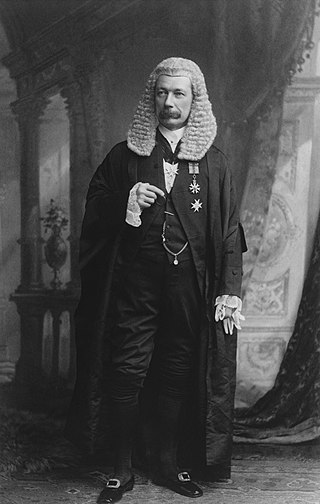Related Research Articles

Southern Nigeria was a British protectorate in the coastal areas of modern-day Nigeria formed in 1900 from the union of the Niger Coast Protectorate with territories chartered by the Royal Niger Company below Lokoja on the Niger River.

Colonial Nigeria was ruled by the British Empire from the mid-nineteenth century until 1 October 1960 when Nigeria achieved independence. Britain annexed Lagos in 1861 and established the Oil River Protectorate in 1884. British influence in the Niger area increased gradually over the 19th century, but Britain did not effectively occupy the area until 1885. Other European powers acknowledged Britain's dominance over the area in the 1885 Berlin Conference.
The chief justice of Nigeria or CJN is the head of the judicial arm of the government of Nigeria, and presides over the country's Supreme Court and the National Judicial Council. The current chief justice is Kudirat Kekere-Ekun who was appointed on 22 August 2024. She was appointed acting chief justice of the Federation upon the retirement of incumbent chief justice, Olukayode Ariwoola. The Supreme Court of Nigeria is the highest court in Nigeria and its decisions are final. The chief justice of Nigeria is nominated by the president of the Federal Republic of Nigeria upon recommendation by the National Judicial Council and is subject to confirmation by the Senate of the Federal Republic of Nigeria. The CJN holds office at the pleasure of the Nigerian constitution and can only be removed from office by death or on attainment of age 70 whichever occurs first or by impeachment by the Senate of the Federal Republic of Nigeria which requires a super majority of the members of the Nigerian Senate.
Idris Legbo Kutigi was a Nigerian lawyer and jurist. He was Attorney General and Commissioner for Justice in Niger State before becoming a high court judge. He joined the Supreme Court of Nigeria in 1992 and served as Chief Justice from 30 January 2007 to 30 December 2009.

Sir Herbert Richmond Palmer was an English barrister, who became a colonial supervisor for Britain during the inter-World War period. He served as a lieutenant governor in Nigeria, governor and Commander-in-Chief of The Gambia and governor and Commander-in-Chief of Cyprus.

Sir William Brandford Griffith, CBE was a British legal writer and colonial judge who was the Chief Justice of the Gold Coast from 1895 to 1911.

Lagos Colony was a British colonial possession centred on the port of Lagos in what is now southern Nigeria. Lagos was annexed on 6 August 1861 under the threat of force by Commander Beddingfield of HMS Prometheus who was accompanied by the Acting British Consul, William McCoskry. Oba Dosunmu of Lagos resisted the cession for 11 days while facing the threat of violence on Lagos and its people, but capitulated and signed the Lagos Treaty of Cession. Lagos was declared a colony on 5 March 1862. By 1872, Lagos was a cosmopolitan trading centre with a population over 60,000. In the aftermath of prolonged wars between the mainland Yoruba states, the colony established a protectorate over most of Yorubaland between 1890 and 1897. The protectorate was incorporated into the new Southern Nigeria Protectorate in February 1906, and Lagos became the capital of the Protectorate of Nigeria in January 1914. Since then, Lagos has grown to become the largest city in West Africa, with an estimated metropolitan population of over 9,000,000 as of 2011.

Sir John Worrell Carrington, was a British jurist, elected representative, and colonial administrator between 1872 and 1902. He served the Caribbean colonies of Barbados, St. Lucia, Tobago, Grenada, and British Guiana until his final appointment as Chief Justice of Hong Kong.

Sir Gerard Howe KC was a British lawyer and judge. He was Chief Justice of Hong Kong in the early 1950s.
Sir John Curtois Howard KC was an English magistrate who was the 27th Chief Justice of Ceylon. He was appointed in 1939 succeeding the acting Francis Soertsz and was Chief Justice until 1945. He was succeeded by Arthur Wijewardena, also after the acting Francis Soertsz.
Sir Alexander Wood Renton was a Scottish lawyer and British colonial judge. He served as the 21st Chief Justice of Ceylon from 1914 to 1918.
The 1904 Birthday Honours were announced on 9 November 1904, to celebrate the birthday of King Edward VII that day. The list included appointments to various orders and honours of the United Kingdom and the British Empire.
The 1908 Birthday Honours for the British Empire were announced on 28 June, to celebrate the birthday of Edward VII.
The 1905 Birthday Honours for the British Empire were announced on 30 June, to celebrate the birthday of Edward VII on 9 November.
Chief Candido Joao Da Rocha was a Nigerian businessman, landowner and creditor who owned Water House on Kakawa Street, Lagos Island, Lagos, and was the proprietor of the now defunct Bonanza Hotel in Lagos. He held the chieftaincy title of the Lodifi of Ilesa.
Sir Philipos Bertie Petrides, known as Philip Petrides, was a British colonial judge and administrator.
Sir Edwin Arney Speed was the Chief Justice of Nigeria from 1914 to 1918. He was highly thought of by Lord Lugard who secured his appointment as the Chief Justice of the amalgamated Southern and Northern protectorates. He was tasked by Lugard to unify the laws of the two colonies and to establish a single Supreme, Provincial and Native court system.
Sir Edward John Davies was a Welsh lawyer and colonial judge, who served as Solicitor-General of Trinidad (1935–38), Solicitor-General (1941–46) and Attorney-General (1946–55) of Singapore, and Chief Justice of Tanganyika (1955–60).
Sir Herbert Charles Fahie Cox was a British lawyer who served in various positions in the colonial legal service, including chief justice of Northern Rhodesia, Tanganyika and Bechuanaland.
Attorney General Osborne may refer to: